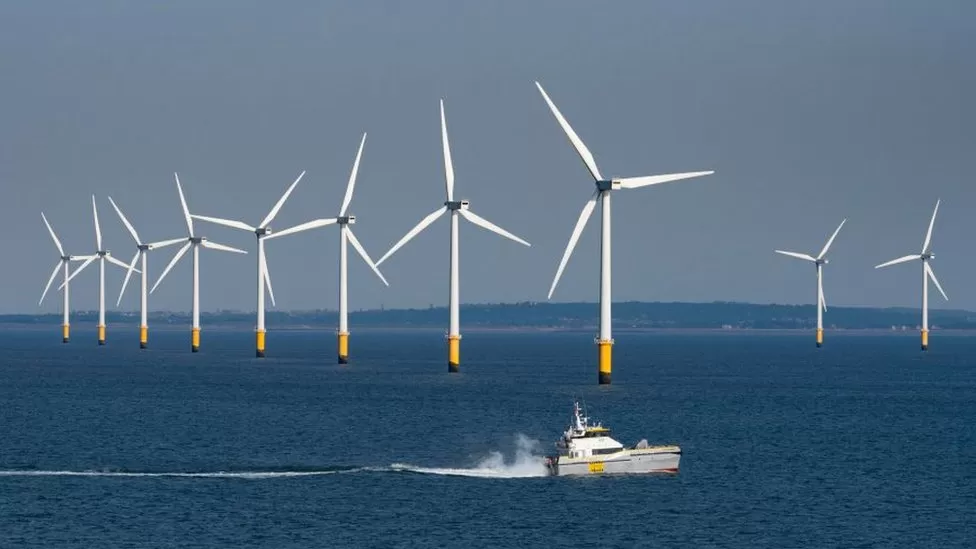
Price paid for offshore power to rise by 66%
The price paid to generate electricity by offshore wind farms has been raised by 66% as the government tries to entice energy firms to invest.
It comes after an auction for offshore wind projects failed to attract any bids, with firms arguing the price set for electricity generated was too low.
The government has lifted the price it pays from £44 per MWh to £73.
It is hoped that more offshore wind capacity will lead to cheaper energy bills.
Companies have said that the cost of building wind farms has soared because of rising inflation and interest rates, while the maximum price they can charge for the electricity they generate has been relatively low.
Energy firms have told the BBC that electricity produced out at sea would remain cheaper and less prone to shock increases compared with power derived from gas-fired power stations.
The UK is a world leader in offshore wind and is home to the world’s four largest farms, supporting tens of thousands of jobs, which provided 13.8% of the UK’s electricity generation last year, according to government statistics.
But when the government revealed in September that no companies had bid for project contracts, plans to nearly quadruple offshore wind capacity from 13 gigawatts to 50 by 2030 – enough to power every home in the UK – were dealt a heavy blow.
The technology has been described as the “jewel in the UK’s renewable energy crown”, but firms have been hit by higher costs for building offshore farms, with materials such as steel and labour being more expensive.
According to energy companies, the government’s failure to recognise the impact of higher costs led some firms to abandon existing projects, and all operators to boycott the most recent auction.
On Thursday, Claire Coutinho, the Energy Security Secretary, said: “We recognise that there have been global challenges in this sector and our new annual auction allows us to reflect this.”
Why is the government paying energy firms?
The way the price guarantee between the government and energy companies works is that when market prices are lower than the set – or “strike” – price, the government makes up the difference.
When they are above the strike price, the generators pay the extra cash back to the government.
But the price paid is only one part of the equation. The other is amount of electricity which the government will ensure is sold at a guaranteed price.
The contracts with electricity generators are based on 2012 prices, so will be higher when adjusted for inflation.
Industry sources have told the BBC that to make up for lost time this year and to hit its 2030 target, the government will need to attract bids for six to eight gigawatts of power every year for the next five years.
There is another huge problem in how the power produced out at sea is transported back to land. Hundreds of miles of pylons and underground cables will be required, many of which would, if built, cross privately-owned land.
The BBC understands Chancellor Jeremy Hunt will use his Autumn Statement to find ways to speed up this process by reclassifying such connections as critical national infrastructure, while also consulting on ways to compensate affected communities – including farmers – by offering discounts on energy bills.
“A combination of stick and carrot,” as one industry source described it. “We can’t continue to let small wealthy communities block energy developments for poorer but larger communities.”
The measures will be part of a broader government ratification of an energy review conducted by the UK’s electricity networks commissioner, Nick Winser, which laid out a series of recommendations to accelerate the connection of new power sources to the National Grid.
It is understood that the problem was thrown into very sharp relief when ministers were told that under current rules, a planned battery plant in Somerset might have to wait more than a decade to get connected to the electricity network.